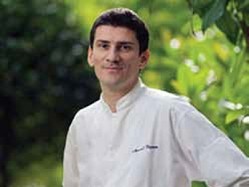Arnaud Bignon: Pearls of Wisdom

I started cooking for pleasure when I was about 10 years old. Sometimes I would cook together with my grandmother for 10 or 15 people, peeling vegetables and doing simple jobs. It was wonderful.
If you create a great dish but your staff don’t know how to serve it, it is a disaster. Front of house is so important.
As a chef, London is the place you have to be at the moment, much more so than Paris. The chefs over here really want to improve their skills and techniques while in France they tend to rest on their laurels. The quality of the produce in the UK is also excellent.
Of course I want a third Michelin star. Even if I don’t get one I think that striving for one every day works for the greater good of the restaurant and for its guests.
I work on the acidity of a dish all the time so that when you eat a spoonful of food you immediately want another one. Acidity plays a very important part in that.
My guests are starting to care much more about their health these days. Tasty food doesn’t have to be unhealthy. In Japanese cuisine there isn’t much use of cream or butter and I’m trying to take the same approach with my cooking, using ingredients such as Japanese yuzu.
Every Sunday I would go to my grandfather’s garden and spend a lot of time looking at the fruit and vegetables to see how they grew. It was there that I fell in love with food.
Working in Greece was completely different to London or Paris. It was very hard to find good, consistent produce there. One day it would be amazing, the next day awful. You had to work with a lot of different suppliers, which was challenging.
My biggest inspiration was Éric Fréchon (head chef at three-Michelin starred Le
Bristol in Paris). He spends all day in the kitchen working long hours. He was a very
good mentor to me, and taught me many things, but he was also more of a friend than a chef. I still speak to him a lot.
The most important aspect of being a chef is to not lose sight of what you want
to achieve. And to be at the restaurant as much as you can, because only then can you see the product and the staff on a regular basis. Every lunch and dinner I’m there to ensure we are not making any mistakes – we always need to focus on that.
My biggest achievement was getting two Michelin stars at Spondi (in Athens). It
was the first restaurant in Greece to be awarded two stars, and that made it very
special. Also, winning a second star at The Greenhouse after being there for only a year and a half. That was fast.
I work very hard every day. But when I see that my guests are happy it makes it all worth the effort.
Chefs like Alain Ducasse and Joël Robuchon have great teams around them which is why they can open a number of different restaurants across the world. Me, I prefer having just one restaurant so that I know exactly what happens in it every day.
People are sometimes afraid to go to fine dining restaurants – the atmosphere at some places is too heavy. As a restaurant you have to find a way of making the customer feel comfortable, whatever your style is. If front-of-house staff are too austere and unfriendly it is not nice.
I love to eat Japanese food when I’m not in the restaurant. One of my favourite places to go is Umu, which is owned by Marlon Abela and which serves amazing Japanese cuisine. But I have two children (aged six and 11) which means I tend to have to eat more Italian food these days.
My philosophy is to find the best product and then pair it with three or four ingredients only, no more.
I try to buy as much produce as I can from the UK. Good quality milk-fed veal is very hard to find over here but the fish and shellfish is of exceptional quality.
I don’t want my name above the door, it’s not something I care about.
This interview appears in the March issue of Restaurant magazine, out now.

















